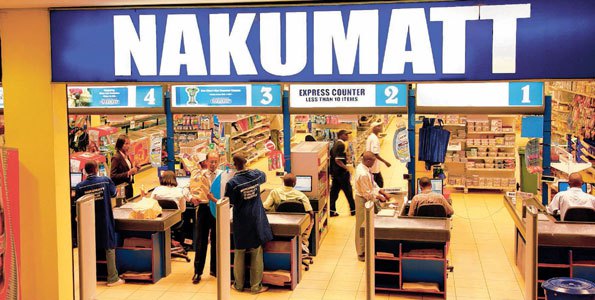Kajoba expects over 3 tonnes of beans from five acres
Abdul Rahman Kajoba,50, was a fisherman (omuvubi) in Kalangala Islands for 20 years. However, when the palm oil project came up, people in the area were sensitized about other income generating activities including coffee.
This is the time Kajoba contemplated quitting his job since he hadn’t gained much from it.
To the surprise of his fellow fishermen, Kajoba quit his job to start commercial farming in 2014 after securing land in Kisiita Town Council, Kakumiro district.
He used his savings to buy the the first piece of land and has since expanded to have 15 acres where Kajoba Memorial Farm sits.
Kajoba tells Business Focus that he started by growing various crops until he zeroed on coffee, cocoa, bananas (matooke) and beans a few years ago.
Coffee and Cocoa
His two-year old coffee sits on 15 acres and integrated with cocoa and matooke. He used 4m*4m spacing so as to accommodate cocoa. His soil isn’t the best but he has acquired knowledge on how to make it work. For coffee, Cocoa and matooke, Kajoba digs bigger pits/holes compared to the recommended standard ones (2ft*2ft). His holes are either 4ft*4ft or 3ft*3ft.
He says he mainly uses cow dung to boost the fertility of his soil.
“I don’t have cows, so I buy cow dung which I use especially when I am planting coffee, cocoa and matooke,” he says, adding that an elf truck costs about Shs180,000 in his area. In future, Kajoba wants to keep some animals to cut expenditure on manure.
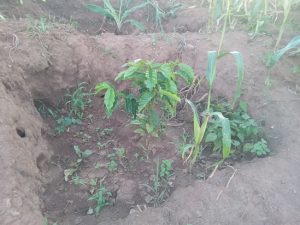
“The coffee is two years old and it has started yielding. Cocoa has also started producing,” Kajoba says, adding that he used his savings to buy the planting materials. For coffee, he planted the popular CWDr (Coffee Wild Disease Resistant Varieties) aka KR Varieties.
He says the old matooke plantation is eight acres and he’s been harvesting from it for the last seven years.
Asked on what makes his farm a model one in the area, Kajoba says he only plants quality planting materials.
“For matooke, I only planted Mpologoma because it has big bunches,” he says, adding that he recently added more five acres of matooke.
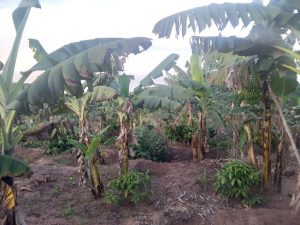
Asked about market for his matooke, Kajoba says he can’t satisfy the existing market. Buyers of his matooke mainly come from Kisiita Town Council and Hoima City.
“Buyers find me at the farm,” he says, adding: “On average, I earn a gross income of Shs1.5m from matooke alone.”
‘Blackoff Natural Fertilizer saved my beans’
In the second season of 2023 (current season), Kajoba planted beans on five acres where he has had a bountiful harvest. He says he grows Masavu and NARO Bean1 which his sells at Shs3000 to buyers who contracted him. The beans were planted in his burgeoning coffee and cocoa farm.
At the time Business Focus visited this promising farmer a week ago, Kajoba had already harvested 1,500 kilograms of masavu beans. He expects to harvest over 3,000 kilograms of beans this season, a record for him since he started growing them. This means he expects to earn a gross profit of over Shs9m given the fact that a kilogram goes for Shs3000.
He attributes the high yields to Blackoff Natural Fertilizer.
“My beans were yellowish. Some had started dying away. When I reached out to the Kisiita Town Council Agricultural Officer, he told me the soil was lacking nutrients. I decided to try out Blackoff Natural Fertilizer because I had heard some farmers praise it,” Kajoba says, noting that he didn’t have a lot of money to buy inorganic fertilizers where a 50-kg bag was costing over Shs150,000 in the area.
“After applying Blackoff Natural Fertilizer, my beans rejuvenated and the yields have been massive. As you can see, most of the plants have over 30 pods. Some have up to 80 pods,” Kajoba says, pointing to the bountiful harvest awaiting him.
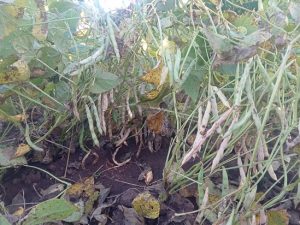
He urges other farmers to embrace the product, describing it as “a miracle fertilizer” for farmers.
“I didn’t have faith in this product but decided to try it out first. I would encourage farmers to buy a few litres and try out this product,” he says, adding: “I have bought more Blackoff to apply it on coffee and cocoa as we approach the dry spell.”
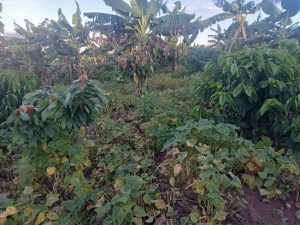
It should be noted that on August 19, 2022, the Agricultural Chemicals Board under the Ministry of Agriculture, Animal Industry and Fisheries (MAAIF) approved the registration of ‘Blackoff’ Liquid Natural Fertilizer, a broad spectrum pest-repellent natural fertilizer under Reticia Products Research.
The product was approved after Government-owned Namalere Agricultural Centre carried out extensive research on the product and found its composition to be NPK 4:14:11+Amino Acids (in technical terms).
Irrigation
Kajoba’s determination saw Government through Kakumiro District Agricultural Department gift him an irrigation system worth Shs20m in March 2023.
“With my big basin-like pits, when I pump water into them during the dry spell, water stays in for some good time. My water doesn’t simply runaway so the plants utilize the water maximally,” he says. He pumps his water from a pond which is located near a swamp at the edge of his farm.
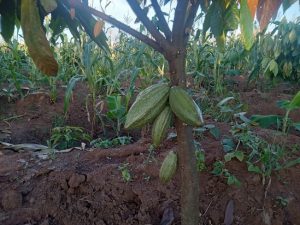
He thanks technical people from Kakumiro District Agricultural Department and Uganda Coffee Development Authority (UCDA) for the constant guidance they render to his farm.
Challenges
He says the biggest challenge for him is fake inputs and pesticides on the market.
“Sometimes you buy pesticides and they don’t work. Government should make efforts to save farmers from fake agro-inputs,” he says.
Lessons
Kajoba says farming requires patience from the farmer.
“Without patience, you can’t succeed in farming. If you want quick gains, farming isn’t for you. Many have run into farming thinking they will be millionaires in four months, but the end hasn’t been good,” he says, adding that giving quality time to the farm is also important in farming. He adds that record keeping and constant research are also vital to successful farming.
On a achievements, Kajoba says he has made many friends from farming. He adds that he’s able to pay school fees for his children and take care of his family.
“I am a model farmer. I get many people who come to visit this farm. I feel I’m having some impact because I teach them the best practices. I also learn from fellow farmers who visit me,” he says.
For tips or get featured, opinions and advertising, Tel: 0775170346/0703828741/staddewo@gmail.com. Follow us on Twitter: @TaddewoS @BusinessFocusug





